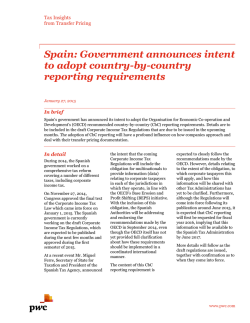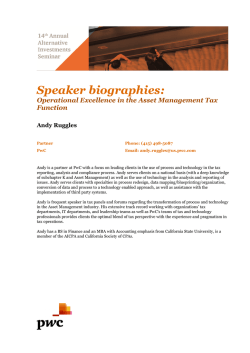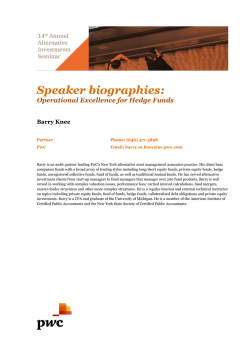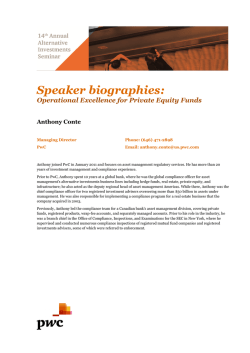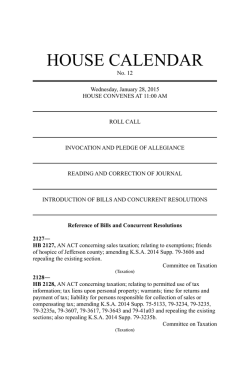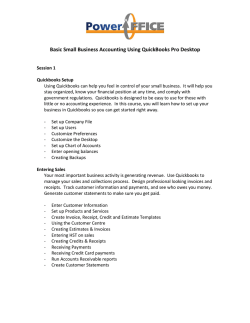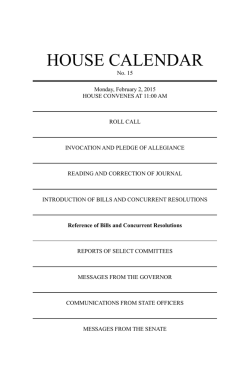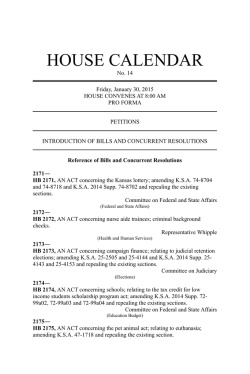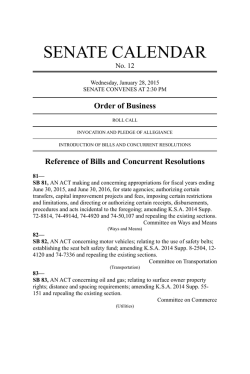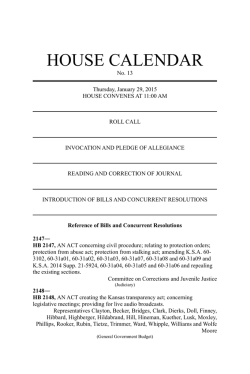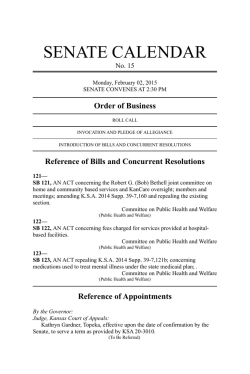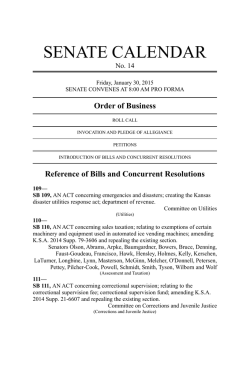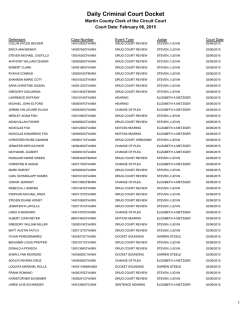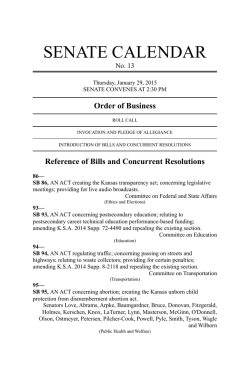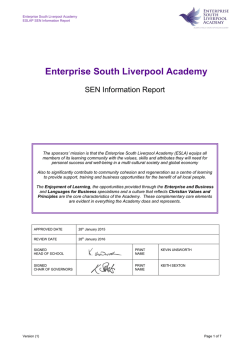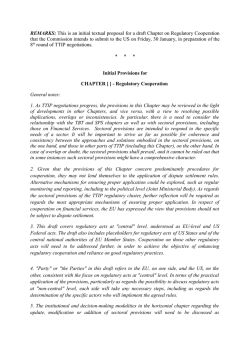
Download PDF
Tax Insights from International Tax Services Congressional Democrats introduce 2015 versions of anti-‘inversion’ and anti-tax haven bills January 28, 2015 In brief Earlier this month, several Congressional Democrats re-introduced bills proposed in prior years to curb perceived abuses involving cross-border mergers and the use of low-tax foreign jurisdictions. House Ways and Means Committee Ranking Member Sander Levin (D-MI) and member Lloyd Doggett (D-TX) on January 20 introduced the Stop Corporate Inversions Act of 2015 (H.R. 415). On the same day, Senate Minority Whip Dick Durbin (D-IL) and Sen. Jack Reed (D-RI) introduced a companion Senate bill (S. 198) (together, the Levin/Durbin bills). Rep. Levin introduced essentially the same bill under the same name in 2014 (H.R. 4679). It would apply Section 7874 to treat a foreign company as a US company (for US federal income tax purposes) where there is greater than 50% continuity of ownership by the predecessor US company's shareholders -- rather than the current 80%. It also would treat a foreign company as a US company if both (1) its management and control, and (2) significant business operations remain in the United States, while it does not have substantial business activities in its country of incorporation. The Levin/Durbin bills are similar to an Obama Administration proposal in the FY 2015 Budget. Rep. Doggett on January 13 introduced the Stop Tax Haven Abuse Act (H.R. 297), and Sen. Sheldon Whitehouse (D-RI) introduced a companion bill (S. 174) (together, the Doggett/Whitehouse bills). This is essentially the same legislation that former Sen. Carl Levin (D-MI) offered under the same name in 2013 (S. 1533). The Doggett/Whitehouse bills propose Section 7874 modifications similar to the Levin/Durbin bills but also have a wider scope. Its provisions would, among other things, tighten foreign financial reporting requirements further, repeal check-the-box entity classification rules, treat certain foreign corporations managed and controlled in the United States as US corporations, and echo previous proposals addressing ‘excess’ IP-related income of controlled foreign corporations (CFCs), intangibles transfers, and interest expense deductibility. The 2015 bills’ legislative prospects are uncertain, especially given Republican control of both chambers of Congress and the uncertain outlook for tax reform. However, if their features are enacted as part of any legislative vehicle, they would have a significant adverse impact, including possible unintended consequences. www.pwc.com Tax Insights In detail Stop Corporate Inversions Act Section 7874 governs the treatment of ‘expatriated’ (‘inverted’) US entities. Foreign entities caught by Section 7874 are generally treated as US entities for purposes of US federal income tax law. Under the Levin/Durbin bills, the definition of an ‘inverted domestic corporation’ would be broadened to include any entity: (a) that acquires, after May 8, 2014, substantially all of the properties of a US corporation, or all of the assets (or a trade or business) of a US partnership (b) for which, after the acquisition, more than 50% of the stock (by vote or value) is held by former shareholders of the US corporation (or former partners of the US partnership), or the management and control of the expanded affiliated group that includes the entity occurs primarily in the United States -- and such group has significant US business activities, and (c) that does not have substantial business activities in the relevant foreign country. The Levin/Durbin bills codify existing regulations regarding the standard for ‘substantial business activities,’ meaning that 25% or more of a company’s employees (by headcount or compensation), sales, and assets are located in the foreign country. A similar but broader standard would apply for purposes of defining ‘significant domestic business activities,’ looking at 25% or more of employees, sales, income or assets. The bills provide authority permitting regulations to stiffen the requirements by raising the 25% threshold for business activities in the foreign country. 2 The bills also provide regulatory authority to determine what constitutes ‘management and control,’ but they deem US management and control if substantially all of the expanded affiliated group’s executive officers and senior management are located in the United States. The legislation would be effective for transactions completed after May 8, 2014. Observation: The 2014 bill appeared after cross-border mergers became a topic of wide public interest, and the proposal has not changed in the 2015 bills. The provisions would go beyond the regulations tightening Section 7874 that Notice 2014-52 announced. The bill’s authors recognize that 1) Treasury and IRS are constrained by their administrative authority and 2) the Administration has indicated that additional administrative action is possible on earnings stripping. Stop Tax Haven Abuse Act The Doggett/Whitehouse bills have a broad anti-abuse scope aimed at tax haven activities, ‘inversions,’ and issues involving both intangibles income and interest expense. The Stop Tax Haven Abuse Act has appeared in similar form in the first year of every Congress since 2005. Most recently, former Sen. Levin introduced it in September 2013, with provisions similar to the international tax provisions in his Cutting Unjustified Tax Loopholes (CUT) Act, as reintroduced in February 2013. All 16 provisions in the Doggett/Whitehouse bills have appeared in one or more of Sen. Levin’s previous bills. Observation: Neither chamber of Congress has brought up any of the predecessor Levin bills for a vote, but Congress has enacted some provisions that had been included in those bills to pay for unrelated legislation. Similarly, it is not likely that votes will be held on the Doggett/Whitehouse bills, but it is possible that specific provisions may appear in other bills as revenue-raisers. Among the key international provisions are proposals to (i) eliminate US taxpayers’ ability to ‘check-the-box’ on foreign business entities that have a single owner without limited liability (or one or more members, all of which have limited liability), (ii) treat certain foreign corporations managed and controlled in the United States as US corporations and (ii) eliminate CFC look-through (Section 954(c)(6)) altogether. The Doggett/Whitehouse bills would limit interest deductions for direct or indirect CFC loans to US shareholders by treating the loans as dividends to the extent of aggregate CFC earnings. Any interest income attributable to such CFC loans would be treated as US-source income. The bill also adopts the Administration’s legislative proposals on provisions (i) creating a new category of subpart F income for CFCs’ excess returns from US-derived intangibles, and (ii) using Sections 367(d) and 482 to limit the impact of outbound intangible property transfers. The bill addresses foreign expense deferral and FTC pooling by reproposing the Rangel legislative language of 2007. Observation: These proposals would all have a significant effect on many global structures currently in place. Note that additional legislation in these areas was introduced in 2014 and could appear again in similar form this year. That legislation included a bill introduced by Sen. Charles Schumer (D-NY) -- and cosponsored by Sens. Durbin and Reed - to further limit interest deductions for certain ‘inverted’ companies with respect to certain debt. The Schumer pwc Tax Insights bill would also require such companies to obtain annual IRS preapproval of related-party transactions for ten years. In addition, Sen. Whitehouse sponsored a bill in 2014 (also co-sponsored by Sen. Durbin) to include in income the unrepatriated earnings of groups that include an inverted corporation. Rep. Doggett introduced a companion bill. The takeaway Although there is little that is new in the 2015 bills, companies that would be affected by these proposals should remain vigilant about the possibility that one or more of these anti-abuse proposals may appeal to members of Congress as revenueraisers for unrelated legislation. This possibility may be particularly important if Congress delays consideration of corporate tax reform due to other political considerations. Let’s talk For a deeper discussion of how this might affect your business, please contact: International Tax Services Mike DiFronzo (202) 312-7613 [email protected] Carl Dubert (202) 414-1873 [email protected] David Sotos (408) 808-2966 [email protected] Oren Penn (202) 414-4393 [email protected] Marty Collins (202) 414-1571 [email protected] © 2015 PricewaterhouseCoopers LLP, a Delaware limited liability partnership. All rights reserved. PwC refers to the United States member firm, and may sometimes refer to the PwC network. Each member firm is a separate legal entity. Please see www.pwc.com/structure for further details. SOLICITATION This content is for general information purposes only, and should not be used as a substitute for consultation with professional advisors. 3 pwc
© Copyright 2026
